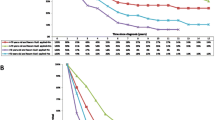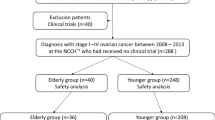Abstract
Purpose
The aim of this study was to examine if treatment strategies differ by age in the elderly population with ovarian cancer in daily clinical practice.
Methods
A retrospective analysis of elderly patients with ovarian cancer who were referred to our institution between January 2007 and August 2010 was done. A univariate analysis for overall survival was estimated according to the Kaplan–Meier method, censoring surviving patients at the time of last follow-up.
Results
We evaluated 32 elderly patients: 17 “young-old” patients (65–74 years old), 14 “old-old” patients (75–84 years old) and 1 “oldest-old” patient (≥85 years old). At last follow-up, 20 patients (62.5 %) were alive and 12 patients (37.5 %) were deceased. Median time follow-up was 18.52 months. Median overall survival was 19.05 months. Median age was 73.50 years. In the subgroup of “young-old” patients, there were less “high malignant potential” (64.3 vs. 70.0 %) and grade 3 ovarian cancers (84.6 vs. 90.0 %), less advanced stages (III–IV: 64.7 vs. 86.7 %), higher number of optimal surgical procedures (50.0 vs. 30.0 %) and more frequent use of chemotherapy (82.4 vs. 66.7 %). Single agent carboplatin was administered in 81.8 vs. 77.8 % of “young-old” and “old-oldest old” patients, and average number of lines was 2 vs. 1. Other characteristics were similar in the two subgroups (“young-old” vs. “old-oldest old” patients). By the univariate analysis, there was no statistical significance difference in overall survival (p = 0.393) between the two subgroups, with only a positive trend for young-old patients.
Conclusions
In old- and oldest-old patients, the characteristics of disease are worse and optimal treatment strategy is less frequently applied. The management of patients by multidisciplinary team is needed and it could better individualize and apply the optimal treatment approach.

Similar content being viewed by others
References
Pallis AG, Fortpied C, Wedding U, Van Nes MC, Penninckx B, Ring A, Lacombe D, Monfardini S, Scalliet P, Wildiers H (2010) EORTC elderly task force position paper: approach to the older cancer patient. Eur J Cancer 46:1502–1513
Franceschi S, La Vecchia C (2001) Cancer epidemiology in the elderly. Crit Rev Oncol Hematol 39:219–226
Thigpen T, Brady MF, Omura GA, Creasman WT, McGuire WP, Hoskins WJ, Williams S (1993) Age as prognostic factor in ovarian carcinoma: the gynecologic oncology group experience. Cancer 71:606–614
Pignata S, Breda E, Scambia G, Pisano C, Zagonel V, Lorusso D, Greggi S, De Vivo R, Ferrandina G, Gallo C, Perrone F (2008) A phase II study of weekly carboplatin and paclitaxel as first-line treatment of elderly patients with advanced ovarian cancer. A multicentre Italian Trial in ovarian cancer (MITO-5) study. Crit Rev Oncol Hematol 66:229–236
Pignata S, Ferrandina G, Scarfone G, Scollo P, Odicino F, Cormio G, Katsaros D, Frigerio L, Mereu L, Ghezzi F, Manzione L, Lauria R, Breda E, Alletti DG, Ballardini M, Vernaglia A, Sorio R, Tumolo S, Musso P, Magni G, Pisano C, Morabito A (2009) Poor outcome of elderly patients with platinum-sensitive recurrent ovarian cancer: results from the SOCRATES retrospective study. Crit Rev Oncol Hematol 71:233–241
Ozols RF (2005) Treatment goals in ovarian cancer. Int J Gynecol Cancer 15:3–11
Wimberger P, Lehmann N, Kimmig R, Burges A, Meier W, Hoppenau B, du Bois A (2006) Impact of age on outcome in patients with advanced ovarian cancer treated within a prospectively randomized phase III study of the Arbeitsgemeinschaft Gynaekologische Onkologie Ovarian Cancer Study Group (AGO-OVAR). Gynecol Oncol 100:300–307
Maas HA, Kruitwagen RF, Lemmens VE, Goey SH, Janssen-Heijnen ML (2005) The influence of age and comorbidity on treatment and prognosis of ovarian cancer: a population-based study. Gynecol Oncol 97:104–109
Zola P, Ferrero A (2007) Is carboplatin-paclitaxel combination the standard treatment of elderly ovarian cancer patients? Ann Oncol 18:213–214
Repetto L, Fratino L, Audisio RA, Venturino A, Gianni W, Vercelli M, Parodi S, Dal Lago D, Gioia F, Monfardini S, Aapro MS, Serraino D, Zagonel V (2002) Comprehensive geriatric assessment adds information to Eastern Cooperative Oncology Group performance status in elderly cancer patients: an Italian Group for Geriatric Oncology Study. J Clin Oncol 20:494–502
Conflict of interest
None.
Author information
Authors and Affiliations
Corresponding author
Rights and permissions
About this article
Cite this article
Giuliani, J., Drudi, F. Ovarian cancer in elderly patients: a difference in treatment based on age?. Arch Gynecol Obstet 286, 1545–1548 (2012). https://doi.org/10.1007/s00404-012-2486-0
Received:
Accepted:
Published:
Issue Date:
DOI: https://doi.org/10.1007/s00404-012-2486-0




